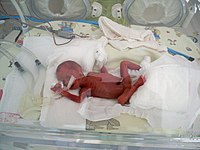
Photo from wikipedia
Elevated maternal BMI and excessive gestational weight gain are associated with increased risk of adverse pregnancy outcomes as well as postpartum weight retention and childhood obesity. There have been several… Click to show full abstract
Elevated maternal BMI and excessive gestational weight gain are associated with increased risk of adverse pregnancy outcomes as well as postpartum weight retention and childhood obesity. There have been several randomized trials that have tested interventions for reducing gestational weight gain and subsequent adverse maternal and neonatal outcomes. Seven of these trials are part of the Lifestyle Interventions for Expectant Moms (LIFE-Moms) consortium, a collaborative group evaluating the effect of behavioral and lifestyle interventions among pregnant women with overweight and obesity (1). In this month’s issue of Obesity, Phelan and colleagues (2) present the 1-year postpartum maternal outcomes from the Healthy Beginnings/Comienzos Saludables trial. This high-quality study was novel in that it paired traditional behavioral weight management intervention techniques with the use of meal replacements during pregnancy. Previously published trial results demonstrated that intervention participants achieved a significantly lower average total gestational weight gain (9.4 vs. 11.2 kg) and a lower rate of gain (0.33 vs. 0.39 kg/wk) compared with controls (3). The intervention ended at delivery and 1-year follow-up was excellent. Unfortunately, despite the modest success of the intervention during pregnancy, there was neither a significant effect of the prenatal intervention on the odds of achieving prepregnancy weight by 1 year post partum nor a difference between the intervention and control groups in the magnitude of weight retained. The authors also found that the use of meal replacements, which were not provided by the study after delivery, was not sustained in the postpartum period.
Journal Title: Obesity
Year Published: 2019
Link to full text (if available)
Share on Social Media: Sign Up to like & get
recommendations!